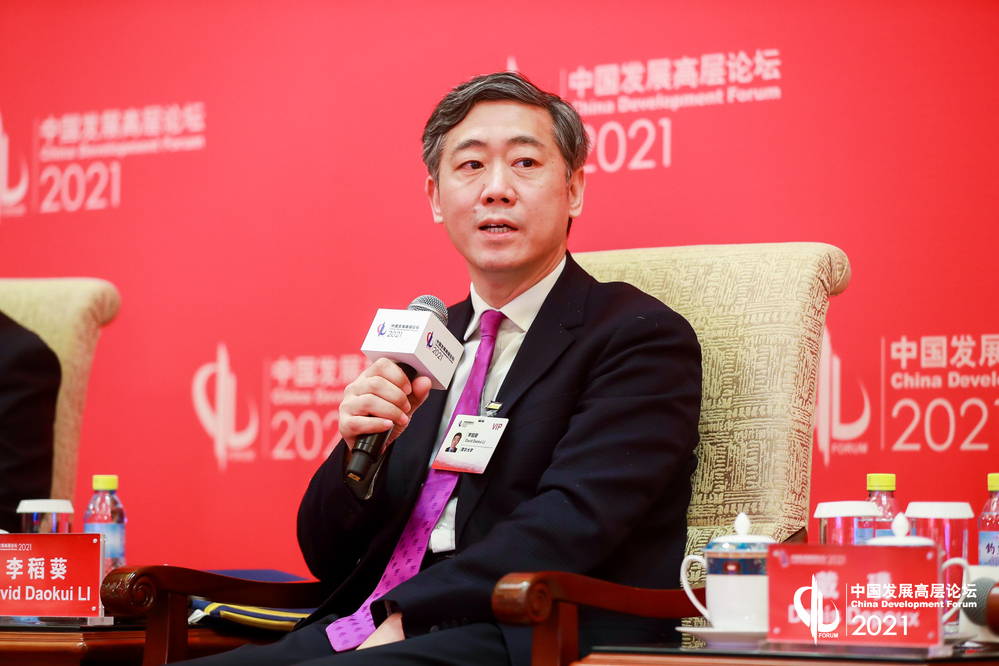David Daokui Li: China has Become a Leader in Sustaining Globalization; Entrepreneurs Should Welcome the New Era
Originally published in Chinese on March 22, 2021 by ACCEPT. Translated by ACCEPT.
Source: http://www.accept.tsinghua.edu.cn/2021/0322/c25a829/page.htm
Speaking at the China Development Forum 2021 Economic Summit, David Daokui Li, Director of the Academic Center for Chinese Economic Practice and Thinking (ACCEPT) and Co-president of the Society for the Analysis of Government and Economics (SAGE), said that China has become a leader in sustaining globalization.
Professor Li explained that China’s breakthrough and launching point as a leader in sustaining globalization has been regional economic and trade cooperation. “This is absolutely not from a place of arrogance. It’s just that there is no doubt that globalization needs leaders, and there is an objective law as to who the leaders should be,” he said.

David Li suggested that there are three basic conditions to become a leader in sustaining globalization. First, a country must be confident in itself and in its ability to develop its own technological industries. Second, a country must have redistributive capacity, which China has due to its institutional advantages. Third, a large market is essential.
Professor Li explained that because one of the competition points of globalization is the new science and technology industry, those who can master such technologies can expand their market in the process of globalization, surpassing others in competition and utilizing others’ markets. China now has confidence in its new science and technology industry.
“Redistributive capacity” refers to the ability to redistribute domestic interests in order to respond to the pressures of globalization. In globalization, there are winners and losers, and the “losers” must have redistributive capacity in order to save their economies. “For example, the Chinese city of Shenyang was once a victim of globalization. As soon as the country opened its doors, Shenyang’s machine tool factories were wiped out by German and Japanese firms. What could be done? The city started over and introduced BMW to the area, which allowed 1/3 of fiscal revenue to flow back into Shenyang, saving the city. China has experience in the redistribution of benefits, which is an institutional advantage.”
David Li also acknowledged that frankly, even as a leader in globalization, China is not yet capable of completely reforming the WTO, but it can push for reform one region at a time. During the RCEP negotiations, I observed China playing a leadership role. China has also been active in the negotiation of the China-EU Comprehensive Agreement on Investment (CAI), pushing the European side forward. As for the CPTPP, China has also indicated that it is actively considering joining. These examples show that China is equipped, confident, and willing to become a leader in the new phase of globalization, using regional trade agreements as an entry point,” he said.
The Regional Comprehensive Economic Partnership (RCEP) was initiated by the ten ASEAN countries in 2012, with additional member countries including China, Japan, South Korea, Australia, and New Zealand. At 15 total members, it is considered the world’s largest free trade agreement. The Comprehensive and Progressive Agreement for Trans-Pacific Partnership (CPTPP), which consists of 11 countries—Japan, Canada, Australia, New Zealand, Mexico, Peru, Vietnam, Chile, Brunei, Singapore, and Malaysia—has a total economic volume amounting to 13.5% of global GDP among its member countries.
Professor Li reminded the multinational entrepreneurs at the forum that the next stage of globalization will involve China adjusting many aspects of its domestic economy. Entrepreneurs must be mentally prepared to welcome the new era, he said.
Specifically, David Li said that in terms of IP rights, China is certainly willing to serve as an example and to promote intellectual property protection. Regarding the reform of state-owned enterprises, the international community cannot fail to recognize SOEs, but state-owned enterprises must operate according to the principles of the market economy, and government policies must treat state-owned enterprises and private enterprises equally. The Chinese government is definitely willing to make reforms in this regard. Additionally, Professor Li believes that China has room to reduce tariffs in the next stage.




